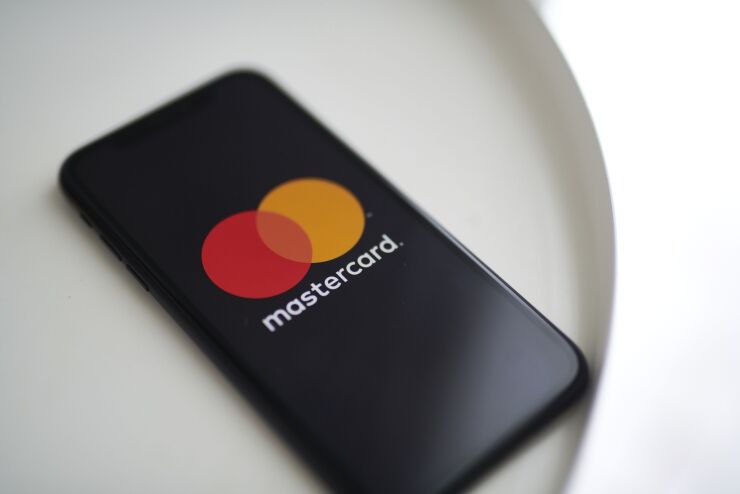
As card firms like Mastercard and Visa grow less reliant on transaction processing for their revenue, they're connecting to a diverse range of third parties that help them offer other services.
Mastercard last week partnered with Stax's CardX to launch Click to Pay on Lightbox, CardX's online payment product. Stax, a merchant-focused technology company,
This follows other partnerships that extend Mastercard's services and technology reach, including deals with JPMorgan Chase and Jack Henry & Associates, which enable Mastercard to extend services such as connecting merchants to payments, improving authentication and streamlining transaction processing.
"The goal is to help enterprises use Mastercard assets with as little stress as possible," said Jess Turner, executive vice president and global head of open banking and API (application programming interface) at Mastercard.
The Stax collaboration centers on
In a slower economic environment, with many merchants facing reduced growth rates, managing costs is a key priority, said Jonathan Razi, chief product officer for Stax and the founder and former CEO of CardX. Its conversations with Mastercard inspired development of the Lightbox online payment product, Razi said.
"Just as important as costs is optimizing approval rates to increase [merchants'] revenues," Razi said, adding that Click to Pay will allow consumers to be authenticated at checkout, enabling faster processing. "The partnership with Mastercard will allow us to bring additional value to these merchants as consumers seek more flexibility and choice in how they pay."
When working with developers and other partners, Mastercard uses a mix of open banking, APIs and other technologies to ease deployment, according to Turner.
Open banking refers to sharing data among partners in and outside of financial services, often using APIs, to make it easier for consumers and businesses to access a broader menu of services from multiple providers.
"Click to Pay is based on card payments," Turner said, adding Mastercard's strategy is to work with acquirers and merchants to standardize online payment capabilities. "We want to ensure everything possible is embedded in the solution we are providing."
Other recent Mastercard partnerships include a collaboration with
Another recent Mastercard collaboration, with
"There's a lot of verification and documentation," Turner said. "By automating parts of that you can reduce the time to market."
An additional recent partnership with
"By having a multi-rail approach, the users have more choices," Turner said. "Open banking is an extension of that, ensuring the transactions are easy and safe."
Visa has also collaborated with outside firms to extend its services business. A recent deal with
The card networks will likely continue adding partners, given the expansion of payment options and technology firms that could cut into the card networks' traditional relationships.
"Payments diversification isn't going away, so rather than doubling down on just traditional card payments, this is really about ensuring connectivity and a role in this diversifying landscape," said Gilles Ubaghs, strategic advisor for commercial banking and payments at Aite-Novarica Group.
For Mastercard, or any other network doing similar work, this partnership approach keeps them relevant and embedded in emerging payment solutions while also diversifying their reach into multiple payment types, according to Ubaghs.
"For the partners, the networks like Mastercard bring their technology and processing capabilities, but I think even more crucially they bring that brand and extremely high levels of trust," Ubaghs said.
The card networks are competing against payment companies that offer potential alternatives to cards. Account-to-account payment directly between banks is an
Buy now/pay later lending is often positioned as a credit card alternative (though the card networks also support installment lending), and real-time payment options that route transactions directly between accounts can also avoid the card networks.
"Payment volumes are still growing [despite economic softness], but it's still volume 'all round' the industry," Ubaghs said. "What we haven't really seen yet is what happens when one of these new payment methods starts stealing share from existing network product lines, which is a possibility."






